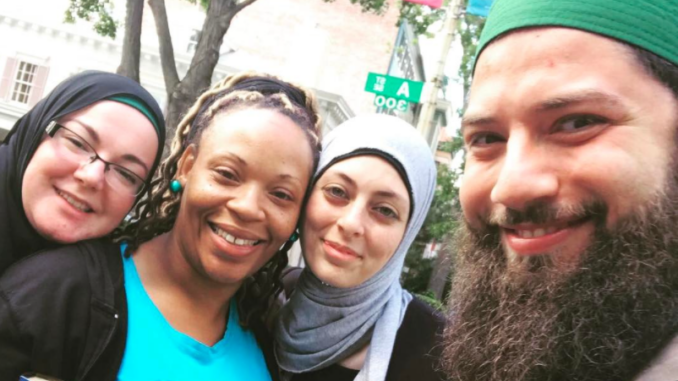
My daughter likes to make fun of what she calls my “hot takes” – when her old man sounds off on whatever topic in the world is bothering him. Ramadan has mostly gotten in the way of my “hot take” on the NPR story on CAIR by Leila Fadel. But a few nights ago after Taraweeh I found myself ruminating on Hassan Shibly’s secret marriages. Something didn’t feel right.
First, a recap:
- Shibly married his wife Imane Sadrati when she was 16. The marriage appears to be recognized by the State of Florida.
- In 2016, according to NPR, Shibly discovered a recent convert named Kyla McRoberts on Snapchat. They entered into a religious marriage **over the phone** with his friend on the line as the only witness. McRoberts thought it was strange but claims Shibly insisted he was getting divorced from his wife Imane and that the marriage was halal.
- NPR also reported that Shibly married another woman in 2016. The woman soon accused Shibly on social media of manipulating her into a religious marriage behind the back of his wife (Imane) – and she tagged CAIR in her posts. Shibly acknowledges the marriage but claims it was not secret. He quickly got a restraining order against the woman and then secured a confidentiality agreement. This Wife #3 was too afraid to speak to NPR, but her friend Lulu Al-Zahrani claims Shibly was emotionally abusive and made up allegations to secure the restraining order.
- In December (of 2020), after Imane launched her GoFundMe campaign, Shibly admitted on Facebook that he had a new wife named Vanessa. After the NPR story ran a few weeks ago, he posted a photo on Instagram of himself with Vanessa.
- Several people have made allegations on social media that Shibly has done temporary marriages with other women, though without names and dates. There are likely several more former Mrs. Shiblys out there.
The Big Question: How could a prominent US civil rights attorney and Shariah expert behave this way? My “hot take”: Shibly is an expert at navigating American and Islamic law… and gaming both systems to please himself.
Check out this interview that Shibly gave several years ago to U Cal Berkeley’s “Othering & Belonging Institute.” The Berkeley folks interviewed Shibley in reaction to infamous anti-sharia law legislation pushed by Islamophobic groups in recent years. During the interview, Shibly makes remarks that take on new meaning given what we now know. Remember, at the time of the interview, no one knew Shibly was a bigamist engaging in serial marriages. But he knew.
In answer to the fourth question in the interview, Shibly argues that a Sharia-based contract between two Muslims should could have legal standing in US court. He then raises the topic of Islamic marriages as an example (italics and bold mine):
Someone could do a katib al-kitab or nikah (an Islamic marriage contract), and be Islamically married, but they shouldn’t expect that agreement to be enforceable by any US court. That would fall into state law, so if the state law recognizes what’s called a common law marriage, which is when a man and women live like they’re married but they’ve never entered into a marriage and they’ve never formally been married through the state, some states recognize that. In those states that recognize common law marriage a katib al-kitab would qualify as a marriage under those state laws, and even then the marriage itself would be governed according to the state rules of marriage.
However, if a state does not recognize common law marriage, then effectively while they may have been married Islamically—and they’re free to be married Islamically, nobody should, or can stop them from doing that—a court can’t treat them as a married couple for legal purposes if there’s no recognition of common law marriage in that state. Now, if a man and women want to enter into a marriage that if should there be a divorce, is governed according to the Islamic principles of divorce, then that’s when there is a need to enter into a binding prenuptial agreement before the marriage, to ensure that such happens. My position is if people don’t enter into a prenuptial agreement before the marriage, they have nothing to complain about when they go to divorce and just the state law is applicable…
If, like me, you are not an attorney, let me break down what Shibly has just revealed about his strategy to avoid breaking US law. Shibly points out that an Islamic marriage is only relevant in civil courts if the particular US state recognizes common law marriage. As a member of the Florida bar, Shibly knows that conveniently his state of Florida DOES NOT recognize common-law marriage. Any woman he marries ONLY in an Islamic ceremony cannot make any legal claims against him for financial support or damages.
Here is Shibly scheme. He will be a bigamist to enjoy the sexual companionship of multiple women, but only under Islamic law so as not to violate American law. In theory under Sharia, he can be married to up to four women at once (though with all kinds of stipulations). Because he is based in Florida, he cannot be caught up in US civil courts – all the more so since he has no formal prenuptial agreement with the impressionable young women he marries (apparently by phone call with a trustworthy buddy on the line).
The Berkeley interview gives special insight into how Shibly justified his despicable conduct to himself. He has in no way violated US law by entering into Islamic-law marriages without a prenup. But is he correct about Islamic law? I don’t think so. Stay tuned.
